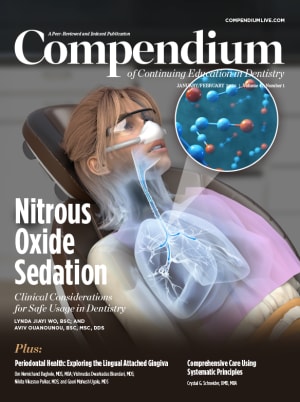Bio-LCB Base/Liner Helps Reduce Sensitivity, Offers Antimicrobial Effect
Since graduating from Southern Illinois University School of Dental Medicine nearly 20 years ago, Stephen Christy, DMD, has developed a healthy approach to integrating new products and technology in his St. Louis, Missouri, practice.
"I've learned that being open to new technologies and new products can change your work life for the better," he explains. "With the advancement of digital technologies, such as intraoral scanners and dental cameras, we are able to deliver better-fitting restorations, as well as decrease treatment/appointment times. New materials and procedures have only shown positive effects for patients and better treatment outcomes."
One specific example of a unique product Christy cites is what he calls his new favorite base/liner, Bio-LCB from Essential Dental Systems (EDS). "I find [Bio-LCB light-cured base/liner] superior to others I've previously used because of its ease of use and how I can place it directly into the cavity prep. This product is so economical compared to other brands. I find myself using it almost daily," he confirms.
Bio-LCB is a bis-GMA free, protective base/liner for use under composites, amalgams, cements, and other base materials. According to EDS, it can serve as a replacement for calcium hydroxide, glass-ionomer, resin-modified glass-ionomer, intermediate restorative material (IRM)/zinc oxide-eugenol (ZOE), and other base/liner restorative materials. Bio-LCB creates an insulator/barrier to protect against sensitivity. Composed of a proprietary urethane dimethacrylate (UDMA)-based formulation, the product, EDS asserts, is super strong and self-adhesive, bonds to dentin, promotes dentin remineralization, and helps prevent secondary decay.
Bio-LCB's composition becomes alkaline upon setting, which has an antimicrobial effect and can help maintain healthy pulpal tissue. The low-polymerization-shrinkage, flowable material, Christy attests, is easy to handle and highly radiopaque. It comes in a syringe for simple, direct application.
"I place Bio-LCB on many of my composite resin preps," Christy says. "I feel confident that this helps with postoperative sensitivity when combined with normal bonding protocols. We have the product ready to go and on the restorative tray during every cavity prep procedure. After slightly drying the tooth, we apply Bio-LCB directly to the dentin prior to any bonding, and then light-cure."
Feedback from patients has been favorable. "Overall, I have experienced a decrease of complaints of postoperative sensitivity commonly associated with deep restorations," he affirms. "Additionally, I like the price point compared to many other base/liners on the market. I also like the delivery and application."
"With technology like intraoral scanners, we are now able to eliminate a second appointment for crown inserts, which really opens up our schedule for more productive procedures," Christy says, adding that the use of intraoral cameras at patient consults helps improve treatment plan acceptance. "And improved materials like Bio-LCB base/liner make for better clinical treatment-a win-win for patients and clinicians."
Stephen Christy, DMD
Private Practice,
St. Louis, Missouri
(EDS)
Essential Dental Systems
201-487-9090
edsdental.com
